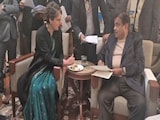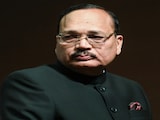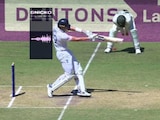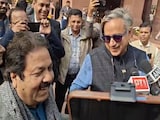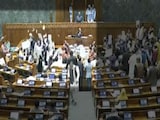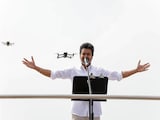A combination of intelligence failure and operational failure on the part of Israel led to the massive death count in the Hamas' attack on Saturday, Israel's former military intelligence head told NDTV in an exclusive interview this afternoon.
The terror attack and Israel's brutal response has already claimed 1,600 lives.
Major General Amos Yadlin (retired) served in the Israel defence forces for 40 years. Following 33 years as a fighter jet pilot, he was the deputy commander of the country's air force. He was also Israel's military attache to Washington, DC, and the head of the IDF Military Intelligence Directorate (Aman). Since 2011, he has been a director with the Institute for National Security Studies, Israel's leading strategic think-tank.
Speaking to NDTV, the veteran said the Hamas strike by land, sea and air was a "surprise attack". "There was no early warning. Either signals were not there, or signals were not picked up. It was a surprise attack, very much like September 11 (9/11), Pearl Harbour, Yom Kippur War. This should be investigated at the end of the war. We are now looking forward," he said.
Major General Yadlin (retired) said the intel failure was followed by an operational failure. "The very sophisticated fence should give time to the forces to stop the enemy, even if they don't get an early warning. There are sensors along the border and somebody was able to neutralise them. This must also be investigated," he said.
Comparing Hamas with ISIS, he said, "They are killing women, children in a very cold way. This Israel won't tolerate. We are now moving to change the rules of the game."
To a question on whether domestic developments such as judicial reforms proved to be a distraction for the security apparatus, he said,"You cannot avoid the question on the leadership, the buck stops at the Prime Minister's desk. He neglected national security, he ignored warnings from defence ministers, intelligence, independent analysts and me."
Israel, he said, is now rebuilding the fence that was breached by Hamas operatives and moving from a defence to attack mode. "Israel has decided that Hamas and its military power will not be in Gaza after the end of this operation," he said.
The Oslo Accords, he said, barred any Palestinian State entity near Israel to maintain a military. "Unfortunately, the Netanyahu government gave Hamas the opportunity to build a military in Gaza. This should be changed."
To a question on who is backing Hamas in its fight against Israel, the veteran pointed to Iran, Syria, the Hezbollah and Houthis in Yemen. "Hamas is not 100 per cent an Iranian proxy, but they are getting a lot of Iranian money and weapons. This is a time to look at Hamas as if it is ISIS. They behave like ISIS. In a way, ISIS is not as cruel as Hamas. They rape, kill young women. Hamas must now be eradicated, destroyed," he said.
Israel, he said, was very efficient in stopping earlier attacks by Hamas. "We built a wall that extended 30-40 metres underground. We were very effective against rockets, both long- and short-range, by having an early warning system. We developed the best anti-rocket system, the Iron Dome. When Hamas understood rockets won't work and tunnels they cannot use, they developed another strategy. Here is the Israeli failure. We were not ready for an attack through the fence above the ground and simultaneously in 10-15 areas. This is an attach Hamas planned and executed in a way that surprised Israel," he said.
On the humanitarian concerns over Israel's announcement of a siege in Gaza, he said the attack on Israel has junked the paradigm of thinking that Hamas cares for the 2 million people in Gaza, about their future, and their lives. "We are now in a full siege of Gaza. It will lead to a humanitarian crisis. But it's Hamas who should be blamed. They have children, women and the elderly (as captives). Israel is going to be tough. We have paid a high price. They want war, they will get war," he said.
To a question on how the war will impact Israel's diplomatic efforts in the region, including the move towards normalising ties with Saudi Arabia, he said, "We are a peace-loving nation. With Egypt, Jordan, UAE. But if somebody pushes us to a corner, Israel knows how to win."
To a question on whether he sees India brokering, given its ties with both countries, the veteran said, "Israel and India relations are very important. We are welcoming any attempt by your Prime Minister to mediate peace."
"However, Hamas is not willing to do any negotiation, any peace. Hamas is a terror organisation, but if (Prime Minister) Modi can make the miracle, we will hold our finger for him," he said.
